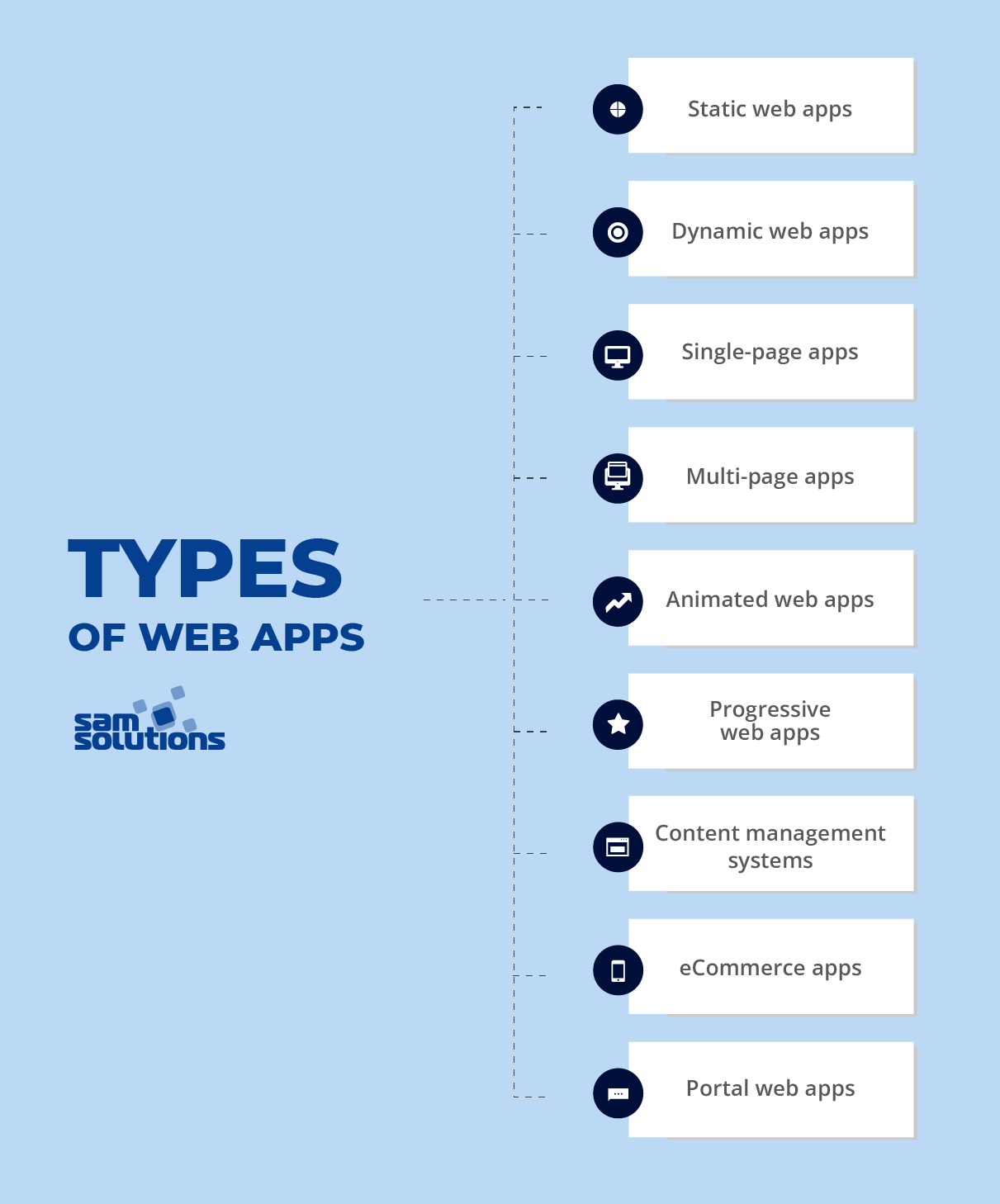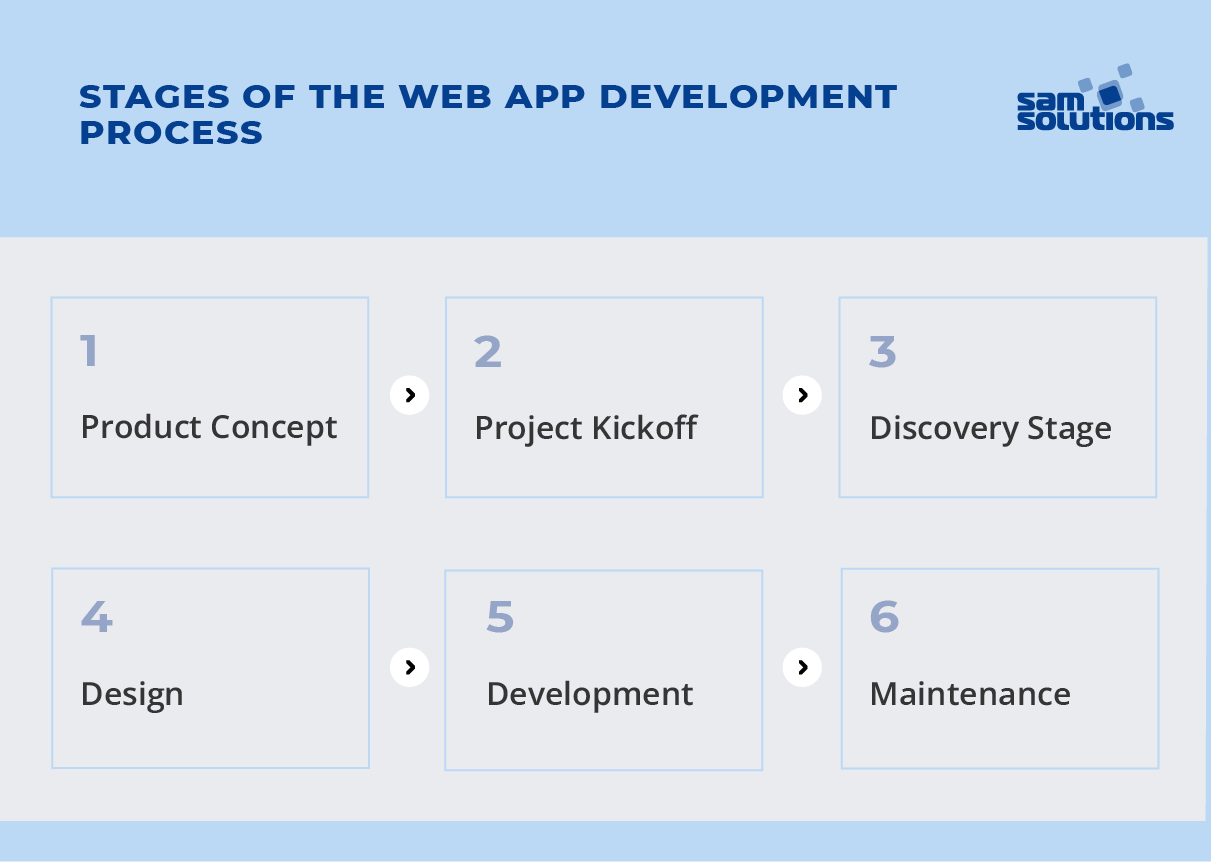For businesses of all domains, it is vital to establish a web presence. Building a web app is a great way to achieve this objective, attract more visitors and improve brand recognition. In this article, we will consider the concept of web application development, its stages, and cost. Read on to learn more.
What Is a Web Application?
A web application is a software program that performs a specific function in the browser. The indispensable characteristic of a web application is that the customers can work with them via browsers, so they do not need to download and install specific apps to use it, they just open them. Often, web app development is confused with web development, because they have some features in common. Nevertheless, web apps function distinctly from websites.
Web apps have significant benefits over other types of software solutions, such as providing easy updating process and platform-agnostic experience.
In addition, we will explore the various types of web applications:
- Static web apps provide the possibility of cheap hosting and easy maintenance. Such apps are not vulnerable to cyberattackers.
- Dynamic web apps allow users to get control and introduce adjustments and updates to published information. Role management option protects the server and helps to manage all current users.
- Single-page apps allow users to route and navigate with great ease, even on mobile devices. They provide quick navigation without the loss of context. The pages are created with the help of frontend technologies. It is possible to enhance SEO characteristics of SPAs as well.
Leverage SaM Solutions’ decades-long expertise in IT to develop high-quality custom software for your business.
- Multi-page apps are renowned for their limitless extensibility, enhanced analytics and better SEO. By contrast with SPAs, the pages are mostly created with the help of backend technologies.
- Animated web apps have a distinct and alluring design to attract customer attention. They are specifically aimed at providing a visually appealing unique layout and offer rich tools to make the user experience unforgettable.
- Content management systems are solutions that allow users to organize content in an easy and effective way. With such systems, quicker development with less backend coding is possible, and even non-technical specialists can manage them with the help of visual page creators.
- eCommerce apps provide an opportunity for businesses of all sizes and domains to sell their goods and services with the help of a single platform. It is possible to scale such apps while your business grows and reach new global markets. Users can expand the functionality of eCommerce apps by integration with various third-party services and introduction of special add-ons.
- Portal web apps allow the centralization of all data. With such apps, you can carry out comprehensive search and management of all available informational materials.
- Progressive web apps are known for their compact nature, fast speed, responsiveness, and browser compatibility. They can carry out updating on their own and function both in online and offline mode. You can download them at almost zero-cost, and they will function like other typical apps on the device. Also, progressive web apps allow the configuration of push notifications for user experience enhancement.

What Is Web Application Development?
Web app development denotes the process of creating a web app. Web apps are focused on interaction with browsers. Mostly, there will be the following procedures in the development process:
- problem definition;
- creating a mock-up of the solution;
- user engagement;
- implementation of frameworks and other tools;
- creating an app;
- testing.
Why Would You Develop a Web Application?
Let’s dwell on the reasons why you have decided to build a web application for your business. In order to get a better grasp of your motivation, we should think over the alternative options that we could choose from.
For example, there may be the following reasons: using a website, creation of a native app, local software package usage, etc. Bearing in mind all these options, we will consider some substantial advantages that you will enjoy if you decide to build your own web app.
Fast Deployments
Among the benefits of utilizing a web application, you will definitely find fast deployment speed. It is not difficult to set up and run a web allocation. In comparison with other types of applications, web applications allow a more simple and flexible work process.
Specialists can implement various tools and frameworks to enhance their development procedures. Therefore, developers usually encounter fewer technical hurdles during their work.
Simplified Access
Today, the majority of users prefer to carry out several activities via browser, both for private and business use. Web application development is a wise move in case you want to simplify access to your services. With web app building, it is easier for your customers to find your services and start using them.
This being said, when your staff have to utilize the variety of tools during working hours, they can always easily access the software they need. In the same way, your clients can do the same no matter what kind of device they are using — smartphones, laptops, or tablets will perform in the same way.
More Convenience
With web app development, you can offer a more convenient and easy way for your customers to use your services. For example, to offer their services online, businesses can resort to either web app development or mobile app development. So long as customers are not always eager to download new applications from the App Store, the first option seems to be more appealing.
Why is it so? Downloading each new app is less convenient than accessing the web app via a browser. Another reason is its practicality, as an abundance of various apps on mobile phones leads to quick low battery and the need to recharge it more often.
Lower Development Costs
If we compare web application development to the building of native applications or full-fledged desktop programs, it is a more budget-friendly option. Besides, it is more time-saving, as the creation of a web application is also significantly faster. The reasons for this is cheaper technologies and a lower level of customization.
Moreover, the utilized frameworks, frontend libraries, and other development tools are pretty ubiquitous. Some web apps can be created with the help of low-code tools, which speeds up the development process by a long chalk.
Stages of the Web App Development Process
The initial step of the web app development model is the building of product concepts, which is a chance for the interested parties to refine the idea of a web app. Usually, the most widespread topics of the query are as follows:
- type of app to be built;
- potential users of the app;
- reasons why they would utilize the apps;
- ultimate objective to be achieved with the application.
When the teams decide to find answers to these questions, it makes the work on the project much more efficient, and it helps specify the most important aspects of the future app’s functionality.
Prior to starting development procedures, the kick-off meetup is really vital. Both in-person or remote communication via Zoom will go. This aims at getting acquainted with all the parties involved in the development process, outlining the modes of cooperation, collaboration instruments and defining specific competencies of team members.
Planning a meeting or call will enhance cooperation among all team members, regardless of their hiring model. Freelancers, outsourced staff, and internal employees – everybody will benefit from this opportunity.
This stage denotes the time frame when the customers and team members can:
- confirm with a prototype how feasible the first concept is;
- carry out tests of various tools;
- plan the infrastructural design and deployment;
- reveal the desires and wishes of the target clientele.
Thanks to this stage, a lot of risks are eliminated while the team tries out various possible outcomes and picks the best strategy. In the end, project backlogs are ready, which consist of lists of tasks for the projects. As a result of such endeavors, the team will get a specified set of project goals which help make the work more efficient and results-driven.
The right design is a critical stage in the web app building. When end consumers use apps, they notice bright, alluring UIs that are eye-catching and pleasant to interact with. Nevertheless, the design starts with a modest beginning in the form of a ballpark wireframe or mockup.
Firstly, top web app development teams create a rough mockup, which helps to confirm that project concepts are in line with the needs of end consumers. Then, this stage helps check if the project plan correlates with the initial ideas and objectives of the stakeholders.
After the previously mentioned stages, the development takes place. After the development, it is important to pay close attention to the comprehensive testing activities and thoroughly prepare the release. Experienced testing engineers would help you make sure that software functions properly and doesn’t have any bugs that would disrupt its smooth functioning.
To ensure trouble-free launching of the app and its stable performance subsequently, it is also important to check if the software functions properly on all the relevant environments and gadgets.
After the launch, the app development doesn’t stop for good. Software development teams carry out the following post-production activities:
- bug fixing;
- introduction of adjustments;
- performance optimization;
- license renewal;
- security improvement;
- enhancement of the product with new features.
Thanks to support and maintenance activities, it is possible to guarantee the outstanding quality of the programs, its ongoing improvement, and continuous enhancement with new functionalities.

What Is the Cost of Web App Development?
The final cost of web app development depends on the complexity of the IT solution that you decide to create. Naturally, the level of how complex and functional your web app is, is correlated with the time and human resources you are going to use. In turn, these aspects influence the final cost.
Further, we will delve a bit more deeply into this topic and consider major aspects that form the web app development cost.
Development Team
Each member of the team adds up to the final cost of the project. Experience of the specialists and their level of seniority will also influence the expenses. Although it may be less expensive to hire fewer team members, this is not always feasible, as most projects require a full-fledged team.
For instance, a typical heavy-load project may consist of backend and frontend developers, a solution architect, UI/UX designer, tester, business analyst, project manager, product owner, and Scrum master. The exact team composition and number of specialists depend on the specifics of the definite project and may vary drastically.
Technologies Used
Each web application development project requires a specific set of technologies and tools. In case your project requires expertise in a programming language or a framework that your employees are not familiar with, you will have two options: to train your personnel or refer to the services of additional staff who have the relevant level of proficiency.
In IT since 1993, SaM Solutions offers professional custom software development services to clients across all industries.
Time Frame
The period of time allocated for the development of a specific web app depends on how accurate the planning stage was. It is extremely important to calculate the most relevant time frame, as the incorrect calculation will result in unnecessary expenditures that can overshoot the planned amount of investments.
Short deadlines can increase the final project costs, as the reduced time frame would require extra efforts. Similarly, a more lengthy period of time would require extra resources as well.
There are different types of web apps, and each one of them has a different cost level. For example, a basic web app that possesses only necessary features without any fancy functionalities will cost less than a heavy application rich in abundant features.
Besides, a properly developed web application must be in line with specific compliance regulations that relate to the relevant business domain, be it healthcare, education, financial sector, etc.
Location
Depending on the location, hourly rates of software specialists are different. For example, experts in the same field that live in the USA usually cost more than those located in Central Europe or Asia. Although the level of expertise and the quality of delivered services are the same, the final cost varies. Therefore, it may be more feasible to turn to the services of offshore specialists for more cost-effective solutions.
Near-shore outsourcing services can be really beneficial, if you’d like to communicate with the company in real time, as in this case there will be no significant difference between the time zones.
Besides, an important aspect is the hiring model that you decide to choose. For example, hiring an outsourced web app development team will be more expedient than keeping an in-house team. Another possible option is hiring freelancers, but it may entail potential perils such as lack of proper communication and quality.
Uniqueness
If you decide to introduce cutting-edge innovations to your software, be ready for extra expenses. Top-notch technologies and tools, especially those that are meant to create something revolutionary in your industry, can cost a pretty penny.
When we take into consideration the legacy software, the pricing increases as well. However, such ambitious aims always show a meaningful return on investment, as they increase customer satisfaction, which leads to more profits as a result.
Why Should I Order a Web Application from SaM Solutions
- Profound expertise in web app building. With our seasoned experts, we are ready to take up even the most challenging projects. Thanks to proven dexterity in web app development and skillfulness in the latest tech trends, we have successfully delivered performant and functional web apps for companies across different business domains.
- Competence in the modern web technologies. Our experts are well-versed in top-notch web app instruments. With this rich tool set, we create powerful web applications with great UIs for our clients.
- Ultimate quality. Our attractive high-performant web apps provide amazing user experience for the customers, enhanced with highly secure, reliable and scalable functional characteristics.
- Transparency of processes. SaM Solutions offers transparent well-orchestrated work processes. We follow software development best practices to meet and exceed customer expectations.
- Easy communication. We ensure stable communication with our clients at every stage of the development process, providing timely status reports and updates.
Conclusions
Web app building is a complex process that requires thoughtful preplanning activities. With several stages, the development comprises a full product lifecycle. Hopefully, after reading this article, now you have a better view of all stages.
If you are interested in web app development or need professional advice regarding this topic, please feel free to schedule an appointment with our specialists.



























 5 Reasons Why Your Business Needs a Mobile eCommerce Application
5 Reasons Why Your Business Needs a Mobile eCommerce Application Using Salesforce to Improve Your Sales Pipeline: Five Tips
Using Salesforce to Improve Your Sales Pipeline: Five Tips Cross-Platform Mobile Development: Five Best Frameworks
Cross-Platform Mobile Development: Five Best Frameworks How to Develop Custom Accounting Software
How to Develop Custom Accounting Software 10 Best Web Development Frameworks in 2024
10 Best Web Development Frameworks in 2024












 Top 30 Ecommerce Tools to Elevate Your Business in 2024
Top 30 Ecommerce Tools to Elevate Your Business in 2024 5 Best Tools to Improve Embedded Software Testing
5 Best Tools to Improve Embedded Software Testing Why React and Node.js Are the Top Technologies for Creating High-Performance Web Apps in 2024
Why React and Node.js Are the Top Technologies for Creating High-Performance Web Apps in 2024 10 Best IoT Platforms for 2024
10 Best IoT Platforms for 2024
Thank you for the article. Now I am interested to learn more. I’m going to contact your team and schedule an appointment to get advice on the custom web application for my business.
I have developed an eCommerce app for my company recently. For this, I hired a dedicated web app development team. I am totally satisfied with their services and the quality of the web app I have now.
Thanks, I appreciate the information on the topic that you have provided. I had doubts whether to create a website or a web app. After reading about numerous advantages of the web app, I decided to try it.
Thank you for shedding some light on the topic. Previously, I didn’t have a clear view of how does the process of web app development look like and how the final cost is calculated.
I own a small business and a couple of years ago I hired freelancers to develop a web app for me. It wasn’t a wise move, as I regretted it later. The communication wasn’t great, which influenced the quality of the final product. In the future, I will definitely prefer to work with established company rather than freelancers.
Web app development process seems to be a pretty demanding area for me. I think it’s a good idea to resort to the professional services of a software development company.
I have hired a web app development team in the past. First time I dealt with an onshore team, and the other time I hired offshore software developers. I didn’t notice any difference in the quality, but the second solution was more money-saving for me.